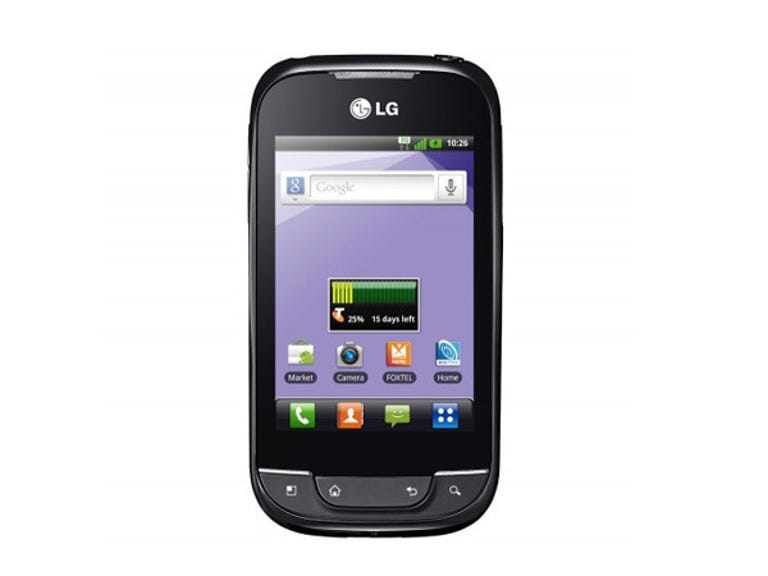 Why You Can Trust CNET
Why You Can Trust CNET LG Optimus Spirit review: LG Optimus Spirit
The Optimus Spirit is an excellent-value smartphone, with a decent screen and a good camera, held back by some minor performance issues.
Design
In some ways, designing a prepaid mobile must be more difficult than designing the flagship model for a brand. After all, a prepaid model must be cost effective, but it can't appear to be. The Optimus Spirit is a good example of this, with LG choosing solid-feeling plastic materials for the handset — although the Spirit is a handset that would never be mistaken for something more expensive.
The Good
The Bad
The Bottom Line
LG's decision to use a 3.2-inch HVGA LCD display is generous at this price point, though it's also the minimum you'd hope to have in an Android smartphone. Any smaller, or less clear, and you'll notice it in everyday use. As it stands, the screen here is fine; it's colourful, there are enough pixels to work comfortably and the panel isn't recessed too deeply below the glass, so there is decent richness in the blacks and darker notes.
The look of the Spirit isn't particularly pleasing, but it's definitely functional. The external buttons are a little smaller, and the power button in particular is hard to press. On the back is a 3-megapixel camera, but no flash, and under the battery cover (and battery) is a microSD card slot, but no microSD card.
User experience and performance
LG adds colour to the stock Android Gingerbread experience with the same custom interface overlay that we saw earlier this year on the Optimus 2X and the Optimus 3D, minus some of the more processor-taxing widgets, like the 3D clock/weather widget. These omissions show that LG was concerned that the 800MHz processor in the Spirit wouldn't handle the complete LG Android experience, but we'd argue that LG didn't go far enough in its trimming back. The user experience, although perfectly functional, is a bit sluggish in a number of places across everyday use.
If you find the jerkiness of the animation across the system irritating, you can turn off most of the animations in the system menu. Start by selecting the hardware Menu button, then choose Settings. Under Display, you'll see the Animation option, and you'll be able to choose to show only some animations or turn them off altogether. This doesn't help to smooth out the transitions when sliding between screens, but it will help the phone feel a bit faster overall.
These criticisms shouldn't be confused with criticisms of LG's UI, though. Even the system is a bit too taxing for the hardware included, and the UI is still well designed and adds some important usability enhancements. We love that you have several app-drawer layout options, and the quick settings and music player on the notification curtain.
Battery life is a weakness, though, with the Spirit managing only to scrape through a business before running on empty. This is a bit of a surprise, given that the Spirit packs a 1500mAh battery and only needs to power a 3.2-inch medium-resolution screen. We also tried to pressure test the Spirit by continuously running an HD video, but the phone wasn't able to play a video file of this resolution.
Camera
We often overlook the cameras in prepaid phones, but the 3-megapixel camera here is worthy of a closer look. There is no flash to light darker shots, but, when you provide the light, the camera on the Spirit does a good job of colouring the images and shooting in focus.

Though this image may seem dull, the colour reproduction is natural and the focus is sharp.
(Credit: CBSi)
The camera struggles here with the mix of colour temperatures, but the colour reproduction is still quite good.
(Credit: CBSi)
Compared to
| LG Optimus Spirit | Samsung Galaxy Gio | HTC Wildfire S | Huawei Vision |
|---|---|---|---|
| Android 2.3.3 | Android 2.2 | Android 2.3 with Sense | Android 2.3.5 |
| 3.2-inch screen 320x480 pixels | 3.2-inch screen 320x480 pixels | 3.2-inch screen 320x480 pixels | 3.7-inch screen 480x800 pixels |
| Qualcomm, 800MHz | Qualcomm, 800MHz | Qualcomm, 600MHz | Qualcomm, 1GHz |
| 512MB RAM | 278MB RAM | 512MB RAM | 512MB RAM |
| AU$149 (locked) | AU$149 (locked) | AU$199 (locked) | AU$279 |
Should you buy it?
It's difficult to pick a winner amongst this year's best prepaid handsets, and the Optimus Spirit adds to this collection nicely. LG doesn't extend itself too far in delivery a good phone on a budget, and a slightly faster processor would have made a big difference here, we feel, but for AU$149 (through Telstra), the Optimus Spirit is still excellent value for money. Its screen is sharp and colourful, and its 3-megapixel camera is good, although we wouldn't rely on it for important pics.
If you can afford the difference, and you are happy to sign on with either Vodafone or Optus, we suggest you take a look at the Huawei Vision for a prepaid phone with a real kick behind it.


